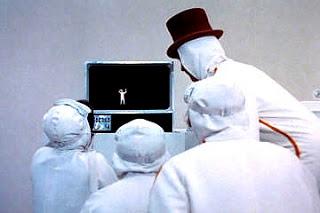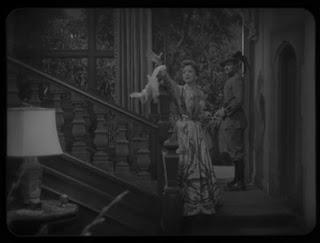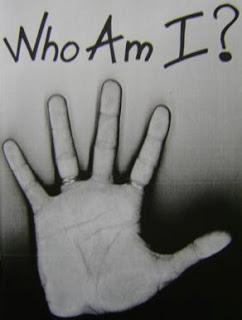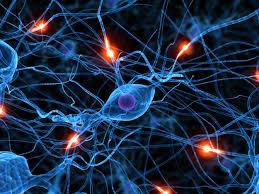For some years now I've been watching Masterchef and Next Food Network Star and Chopped. I like that there is no swearing and very little of the worst parts of the culture (though it is creeping in now with many chefs praising their same-sex partner, or seeing the plethora of tattoos...).


 But even in these innocuous shows there has been a recent and precipitous downward slide. I noticed this most starkly on the show that premiered this week, "The Next Food Network Star." (TNFNS). It is season nine of this venerable competition. The premise is, the multi-week competition is a vetting process to unearth raw talent, and the last one standing gets their own show on the network. Who doesn't like the story of the starlet sitting at a stool at the local drugstore in Hollywood and being discovered? Who doesn't like the notion overall of discovering treasure? Of turning over a geode to discover the gem inside?
But even in these innocuous shows there has been a recent and precipitous downward slide. I noticed this most starkly on the show that premiered this week, "The Next Food Network Star." (TNFNS). It is season nine of this venerable competition. The premise is, the multi-week competition is a vetting process to unearth raw talent, and the last one standing gets their own show on the network. Who doesn't like the story of the starlet sitting at a stool at the local drugstore in Hollywood and being discovered? Who doesn't like the notion overall of discovering treasure? Of turning over a geode to discover the gem inside?
The thought that someone like me could find fulfillment in their dream of sharing their talent with the world is one that is universally shared, I think. The vetting process of TNFNS is one that transforms the roughness of the person into a talent that will yield something worthwhile- good food and time well spent with a nice person (on tv).
I was disappointed this week when the show premiered to see that there was a contestant that had already appeared on Chopped. Danushka Lysek. This seemed somehow...cheating. Then in researching further, I found out that MOST of the contestants on TNFNS had already appeared in other cooking shows, reality competitions, and/or television shows on other networks.
- Chris Hodgson was on the Great Food Truck Race.
- Viet Pham was on Extreme Chef.
- Stacy Poon-Kinney was on Restaurant Impossible.
- Connie “Lovely" Jackson was on season 6 of Gordon Ramsay's H-ll's Kitchen.
- Russell Jackson was on Iron Chef America.
- Nikki Dinki is a food blogger and youtuber but has appeared on The Sopranos as Bibi in the episode Johnny Cakes.
- Rodney Henry was on Paula Deen, Down Home with the Neelys, Throwdown with Bobby Flay and Chopped.
- Danushka Lysek, was on 24-Hour Restaurant Battle, Chopped, The Bachelor, Models Edition Fear Factor VH1's Supergroup, Fear Factor and now on TNFNS. (source & source)
Let's take a look at the contestant named Danushka, though. The fakery of reality tv is not my main point. It is this: for a large section of the population, the unreal life as presented on reality tv HAS BECOME their life.
Danushka has flitted from show to show, making a life career out of being on tv for the no good reason other than she wants to be on tv. A permanent dweller on reality TV, as it were.
Wikipedia explains this penchant, it is the phenomenon of being famous for being famous, epitomized in the model and celebrity Paris Hilton. "Critics also suggest that Hilton epitomizes the title of famous for being famous; she is an example of the modern phenomenon of the "celebutante", the celebrity who rises to fame not because of their talent or work but because of their inherited wealth and controversial lifestyle."
Was there such a thing as a celbutante in eras past? I believe not.
The term 'celebutante' is also explained, "Famous for being famous, or famous for nothing, in popular culture terminology, refers to someone who attains celebrity status for no particular identifiable reason such as acting, music, writing, politics, or modeling, or who achieves fame through association with a true celebrity. The term is a pejorative, suggesting that the individual has no particular talents or abilities. It was coined by historian and social theorist Daniel J. Boorstin. In his book, he defined the celebrity as "a person who is known for his well-knownness". He further argued that the graphic revolution in journalism and other forms of communication had severed fame from greatness, and that this severance hastened the decay of fame into mere notoriety. "
You're great, (Lincoln), you're famous, (Coco Chanel), you're notorious, (Charles Manson), you're celebutante (Kim Kardashian). Decay was a good term to use in the decline of whom we exalt in culture. It is actually not just a slide into decline, but is a see-saw, with today's version of celebrity disappearing from life into into the gaping maw of reality tv.
I've said many times on the blog that the media in general and the news media in particular is front and center on the war for your mind. It is the theater of ideas, and what is presented to us is absorbed into our mind, and it transforms the mind. When we repeatedly see an idea presented as truth, we begin to believe it. If you doubt this process, just think back to Genesis 3 in the garden, and satan's persistence in introducing poisonous ideas into the mind of Eve. It's like for many people, reality tv is more real than life, and for some of those, constantly being ON reality tv IS their life. And if they are not, they are thinking about it. hey have lost their grip on reality.
"Therefore Sheol has enlarged its throat and opened its mouth without measure; And Jerusalem's splendor, her multitude, her din of revelry and the jubilant within her, descend into it." (Isaiah 5:14)
This lure of television (or movies) is so palpable that it was spoofed in Willy Wonka & the Chocolate Factory- the 1971 version. In that movie we get Mike Teavee, a boy who does nothing but watch television and thus, whose reality has been skewed by TV to the point that he always thinks he is on tv, and finally becomes a character who lives inside one, rather than a boy living in the world. And he's happy about it.

The old black and white show, Twilight Zone, made a statement on this theme, too. It was in an episode called, "The 16-Millimeter Shrine". In this episode, Ida Lupino played an aging, former movie star who lives and dreams in the past, constantly watching her old movies alone in her room. At the end, she walks into the movie, to forever dwell in the made-up world of film.
 She dropped the scarf on celluloid but her manager found it on the floor in front of the screen as he watched her blow a kiss and turn to go up the stairs, forever to live in a made-up world.
She dropped the scarf on celluloid but her manager found it on the floor in front of the screen as he watched her blow a kiss and turn to go up the stairs, forever to live in a made-up world.Advertising executives, Political campaign managers, and Hollywood spend an inordinate amount of money to change your mind. Media has an incredible pull on the mind. For those who pooh-pooh that your behavior can change over time to be transformed to whatever reality it wishes to present, then why do they spend so much money attempting to do just that? We are influenced by what we see. According to an article in the American Psychological Association, "Vance Packard's 1957 book, 'The Hidden Persuaders,' revealed how advertising agencies used psychologists and other behavioral scientists to probe deep into consumers' minds and build advertising campaigns based on what they found there."
I think 'the hidden persuaders' is a terrific title. It is very apt.
As a matter of fact, many ads are not simply to try and change your behavior from using one brand over another, but make covert and overt promises that if you use their brand you will become like the people they show you using it. "What's really critical is to identify the beliefs ads should target, says Dr. Fishbein, PhD," in an article looking at psychology and the bran and how it is manipulated in advertising." [emphasis mine]
 The cultural claim to your mind is big business and has been for over a century. "There are very many advertisements that do not pay. One man has roughly estimated that seventy-five per cent of all advertisements do not pay; yet the other twenty-five per cent pay so well that there is scarcely a business man who is willing to stand idly by and allow his competitors to do the advertising," noted Walter D. Scott, Assistant Professor of Psychology in Northwestern University, in The Atlantic- in 1904. Fishbein continued,
The cultural claim to your mind is big business and has been for over a century. "There are very many advertisements that do not pay. One man has roughly estimated that seventy-five per cent of all advertisements do not pay; yet the other twenty-five per cent pay so well that there is scarcely a business man who is willing to stand idly by and allow his competitors to do the advertising," noted Walter D. Scott, Assistant Professor of Psychology in Northwestern University, in The Atlantic- in 1904. Fishbein continued,"The struggle has been too fierce for any but the strongest. The inefficient advertisers are gradually being eliminated, and the survival of the fittest seems to be a law of advertising as it is of everything else that develops. The leaders of the profession feel that their work has grown till it is beyond their control and comprehension. They have been successful, and hardly know how it has all come about."
He noted the influence of psychology upon advertising, even at that early date-
"The best thought of the advertising world finds expression in the advertising journals and in the addresses delivered by various experts at gatherings of professional advertisers. In 1895 in one of the leading advertising journals appeared the following editorial: "Probably when we are a little more enlightened, the advertisement writer, like the teacher, will study psychology. For, however diverse their occupations may at first sight appear, the advertisement writer and the teacher have one great object in common—to influence the human mind. The teacher has a scientific foundation for his work in that direction, but the advertisement writer is really also a psychologist. Human nature is a great factor in advertising success; and he who writes advertisements without reference to it is apt to find that he has reckoned without his host."
The advertising of then has morphed into the Reality TV of today- advertising a better life, better people, an entirely new world that is yours for the taking...if you but walk into the TV (metaphorically speaking).
In the magazine Publicity in 1901, we read a quote, "But the future must needs be full of better methods than these to make advertising advance with the same rapidity as it has during the latter part of the last century. And this will come through a closer knowledge of the psychological composition of the mind. The so-called 'students of human nature' will then be called successful psychologists, and the successful advertisers will be likewise termed psychological advertisers. The mere mention of psychological terms, habit, self, conception, discrimination, association, memory, imagination and perception, reason, emotion, instinct and will, should create a flood of new thought that should appeal to every advanced consumer of advertising space."

Source
"...habit, self, conception, discrimination, association, memory, imagination and perception, reason, emotion, instinct and will..." pretty much covers everything, doesn't it? This sums up an identity. The reality TV of today is branding us with a new identity, and blurring the lines of what is real and what is not.The culture (that is to say, satan) wants to grab your mind. Jesus, once He elects you, claims your mind also. It is all about the mind. The struggle is not against flesh, but is in the mind, for your identity and youru reality.
"Do not be conformed to this world, but be transformed by the renewal of your mind, that by testing you may discern what is the will of God, what is good and acceptable and perfect." (Romans 12:2)
The mind is the key to Christian life. Rewiring of the brain the mind is the key to Christian life, therefore its corruption in the believer is what satan seeks most.

For the believer, remember,
--We capture every thought (2 Corinthians 10:5)
--We have the mind of Christ (1 Corinthians 2:16)
--And the peace of God, which transcends all understanding, will guard your hearts and your minds in Christ Jesus. (Philippians 4:7)
--Do not be conformed to this world, but be transformed by the renewal of your mind, that by testing you may discern what is the will of God, what is good and acceptable and perfect. (Romans 2:2)
"...to be made new in the attitude of your minds;" (Ephesians 4:23)
God is busy renewing the believers' mind. He rewires it! He re-knits the synapses of our mind into His likeness, to be conformed to Him and away from the dark wiring of satan's futility, but each time we allow something gross from the culture into it, we are untying the wires He knit together. Or at least polluting them so they work less efficiently.
It is so sad to see the pull of satan suck people into his vortex through the unreality of reality tv and other false media presentations. It is evident that some people live there permanently now. But that is what happens to the Gentiles who walk in futility of the mind. But the reality is Christ. (Colossians 2:17, Hebrews 11:1)
